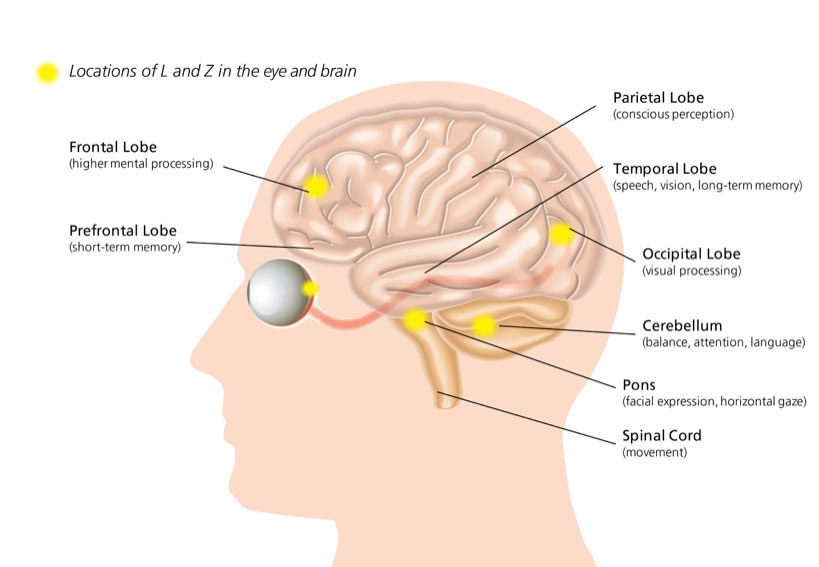The brain is a physical organ and core part of the central nervous system. Cognition refers to the mental process that the brain uses to acquire information and understanding through thoughts, experiences and the senses. Our cognitive abilities can be broadly classified into two groups: crystalized and fluid abilities. Crystallized abilities refer to skills and memories that we have acquired over our lifetime e.g. general knowledge, vocabulary. Fluid abilities refer to our capacity to process, manipulate and transform information to complete a task at a point in time e.g. problem-solving, reasoning.
Cognition can also be divided into specific domains such as memory, perception, language, decision-making, planning and reasoning.
The carotenoids lutein, zeaxanthin and meso-zeaxanthin are preferentially concentrated in the central retina (which is part of the central nervous system) where they are collectively referred to as macular pigment. Interestingly, macular pigment levels correlate positively and significantly with brain concentrations of lutein and zeaxanthin.[4] Therefore, the measurement of macular pigment can be used as a non-invasive clinical biomarker of brain nutrition and potentially of cognitive health, given that higher macular pigment levels have been associated with better cognitive performance in both healthy and cognitively impaired individuals.

When carotenoids are consumed by healthy individuals in high concentrations (i.e. from nutritional supplements), studies have found improvements in a number of cognitive domains including attention, episodic memory (e.g. remembering where you parked your car in a multi-story car park), processing speed and reaction time.[8] To date, no improvements in cognition have been observed among patients with Alzheimer’s disease following carotenoid supplementation, suggesting that earlier nutritional intervention is important. However, pilot work by the NRCI has shown improvements in quality of life (mood, memory and vision) of patient with Alzheimer’s disease following supplementation with carotenoids and omega-3 fatty acids.[9] A
Research is ongoing in order to fully understand the relationship between carotenoids and brain health. However, advances in science and technology have increased our capacity to fully understand the unique neuroprotective mechanisms of carotenoids that are likely to be driving the positive results that have been observed. The suggested neuroprotective properties of carotenoids are likely due to the chemical structure of the carotenoids, their locations within cells and their lipid solubility.

These neuroprotective properties include:
Reducing oxidative stress
Carotenoids are powerful antioxidants and so they can reduce levels of oxidative damage. This is likely due to the chemical structure of the carotenoids, their locations within cells and their lipid solubility.
Reducing neuro-inflammation
Carotenoids also play a role in reducing inflammation of the nervous tissue (i.e. neuro-inflammation) by modulating inflammatory cells and pro-inflammatory enzymes, and down-regulating the production of pro-inflammatory molecules and inflammatory gene expression.
Positively affect the structural properties of membranes
Carotenoids can also affect the structural and dynamic properties of the membranes (e.g. thickness, permeability). For example, it has been suggested that the xanthophyll carotenoid lutein can facilitate the transfer of compounds (e.g., molecules or nutrients) from one cell to another.
Improve neural efficiency
It has also been shown that the xanthophyll carotenoids lutein and zeaxanthin can positively impact neural efficiency, whereby individuals with higher levels of these xanthophyll carotenoids required less brain power to complete the same tasks as individuals with lower levels of these carotenoids.
1. Johnson, E.J., et al., Relationship between Serum and Brain Carotenoids, alpha-Tocopherol, and Retinol Concentrations and Cognitive Performance in the Oldest Old from the Georgia Centenarian Study. J Aging Res, 2013.
2. Nolan, J.M., et al., Macular Pigment, Visual Function, and Macular Disease among Subjects with Alzheimer’s Disease: An Exploratory Study. Journal of Alzheimer’s Disease, 2014.
3. Nolan, J.M., et al., The impact of supplemental macular carotenoids in Alzheimer’s disease: a randomized clinical trial. J Alzheimers Dis, 2015. 44(4): p. 1157-69.
4. Johnson, E.J., et al., Relationship between serum and brain carotenoids, alpha-tocopherol, and retinol concentrations and cognitive performance in the oldest old from the Georgia Centenarian Study. J.Aging Res., 2013. 2013: p. 951786.
5. Feeney, J., et al., Low macular pigment optical density is associated with lower cognitive performance in a large, population-based sample of older adults. Neurobiol Aging, 2013. 34(11): p. 2449-56.
6. Feeney, J., et al., Plasma Lutein and Zeaxanthin Are Associated With Better Cognitive Function Across Multiple Domains in a Large Population-Based Sample of Older Adults: Findings from The Irish Longitudinal Study on Aging. J Gerontol A Biol Sci Med Sci, 2017. 72(10): p. 1431-1436.
7. Vishwanathan, R., et al., Macular pigment optical density is related to cognitive function in older people. Age Ageing, 2014. 43(2): p. 271-275.
8. Power, R., et al., Supplemental Retinal Carotenoids Enhance Memory in Healthy Individuals with Low Levels of Macular Pigment in A Randomized, Double-Blind, Placebo-Controlled Clinical Trial. J Alzheimers Dis, 2018. 61(3): p. 947-961.
9. Nolan, J.M., et al., Nutritional Intervention to Prevent Alzheimer’s Disease: Potential Benefits of Xanthophyll Carotenoids and Omega-3 Fatty Acids Combined. J Alzheimers Dis, 2018. 64(2): p. 367-378.

The information contained in this website does not constitute a recommendation or guidance for decisions concerning the purchase, use or application of products and does not relieve the user of the product of the obligation to undertake its own suitability, performance, quality testing or country specific regulatory approvals. Stauber Performance Ingredients, Inc., including its affiliates (“Stauber”) makes no representations or warranties, either express or implied, of merchantability, fitness for a particular purpose, completeness or accuracy of the information or the products to which the information refers. Stauber shall have no responsibility for any act or omission taken by relying on or using the information contained in this website and in no event shall it be liable for any damages resulting from reliance on or use for any purpose of this information. Without limiting the above, Stauber shall have no responsibility for any act or omission of any other contributor. Readers should take specific advice from an appropriately qualified professional when dealing with specific situations. Nothing in this website is intended to be an offer which is capable of acceptance or an inducement of any kind. Descriptions of, or references or access to other publications within the website do not imply endorsement of those publications. The information contained in this website could contain technical inaccuracies, and changes to the information may be made at any time without notice.